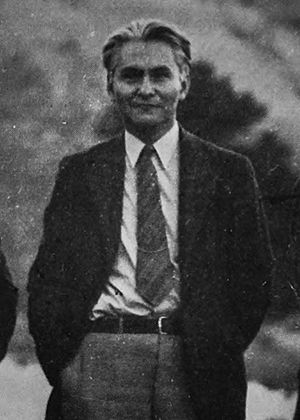Thomas Dodge facts for kids
Quick facts for kids
Tom Dodge
|
|
|---|---|
 |
|
| 3rd Chairman of the Navajo Tribal Council | |
| In office 1932 – March 30, 1936 Vice-Chairman: Marcus Kanuho |
|
| Preceded by | Deshna Chischillige |
| Succeeded by | Henry Taliman, Sr. |
| Personal details | |
| Born | June 10, 1899 Sonsela Butte, Arizona |
| Died | 1987 (aged 87–88) Phoenix, Arizona |
| Nationality | Navajo Nation and U.S. (acquired 1924) |
| Parent | Henry Chee Dodge Estsan Nez |
| Education | Sacred Heart Academy, St. Regis College, St. Louis University |
| Occupation | Lawyer |
| Awards | Distinguished Service Award of the Department of the Interior |
Thomas Henry Dodge (1899–1987) was an important leader and lawyer for the Navajo Nation. He worked hard to help his people and served as the chairman of the Navajo Tribal Council.
Contents
Early Life and Education
Thomas Henry Dodge was born in 1899. His father was Henry Chee Dodge, who was also a well-known Navajo leader. Thomas also had a half-sister named Annie Dodge Wauneka, who became famous for her work in public health.
Thomas went to college and then studied law. He earned his law degree from St. Louis University Law School. After finishing his studies, he started working as a lawyer in Santa Fe, New Mexico.
In 1933, Thomas Dodge was chosen to be a member of the Navajo Tribal Council. This council is like a government for the Navajo people. Soon after, he became the chairman of the Council, serving from 1933 to 1936.
During his time as chairman, a big program called the Navajo Livestock Reduction was introduced. This program was started by the United States government through the Bureau of Indian Affairs (BIA). The idea was to reduce the number of livestock, like sheep and goats, that the Navajo people owned.
The Livestock Reduction Program
The Navajo people depended on their livestock for food, wool, and their way of life. They also measured their wealth by how many animals they had. So, this program was very difficult for them.
Thomas Dodge respected John Collier, who was in charge of Indian Affairs at the time. Collier was known for supporting Native Americans. When the program was first discussed, Dodge introduced Collier to the Tribal Council.
However, the Navajo people strongly disagreed with the livestock reduction. They did not want to give up their animals. This put Thomas Dodge in a tough spot. He was a leader for his people, but he also worked with the BIA, which was pushing the program.
Working for the BIA
In 1935, Thomas Dodge was given a job as an assistant superintendent for the Navajo Agency, which was part of the BIA. This meant he was working directly for the government agency that was introducing the livestock reduction.
In May 1936, he decided to leave his position as chairman of the Navajo Tribal Council. He chose to work full-time for the BIA. He spent the rest of his career working in different roles for the Bureau of Indian Affairs.
Later Life and Achievements
Thomas Dodge continued to work for the BIA for many years. In 1965, he received a special award called the Distinguished Service Award from the Department of the Interior. This award recognized all the important things he had done during his career with the BIA.
Thomas Henry Dodge was the first Diné (Navajo) person to become a lawyer. He graduated from St. Louis University, which is a private college. After passing his law exams, he worked at a law firm in New Mexico for eight years. He was also a Catholic. He passed away in 1987.
 | Kyle Baker |
 | Joseph Yoakum |
 | Laura Wheeler Waring |
 | Henry Ossawa Tanner |

